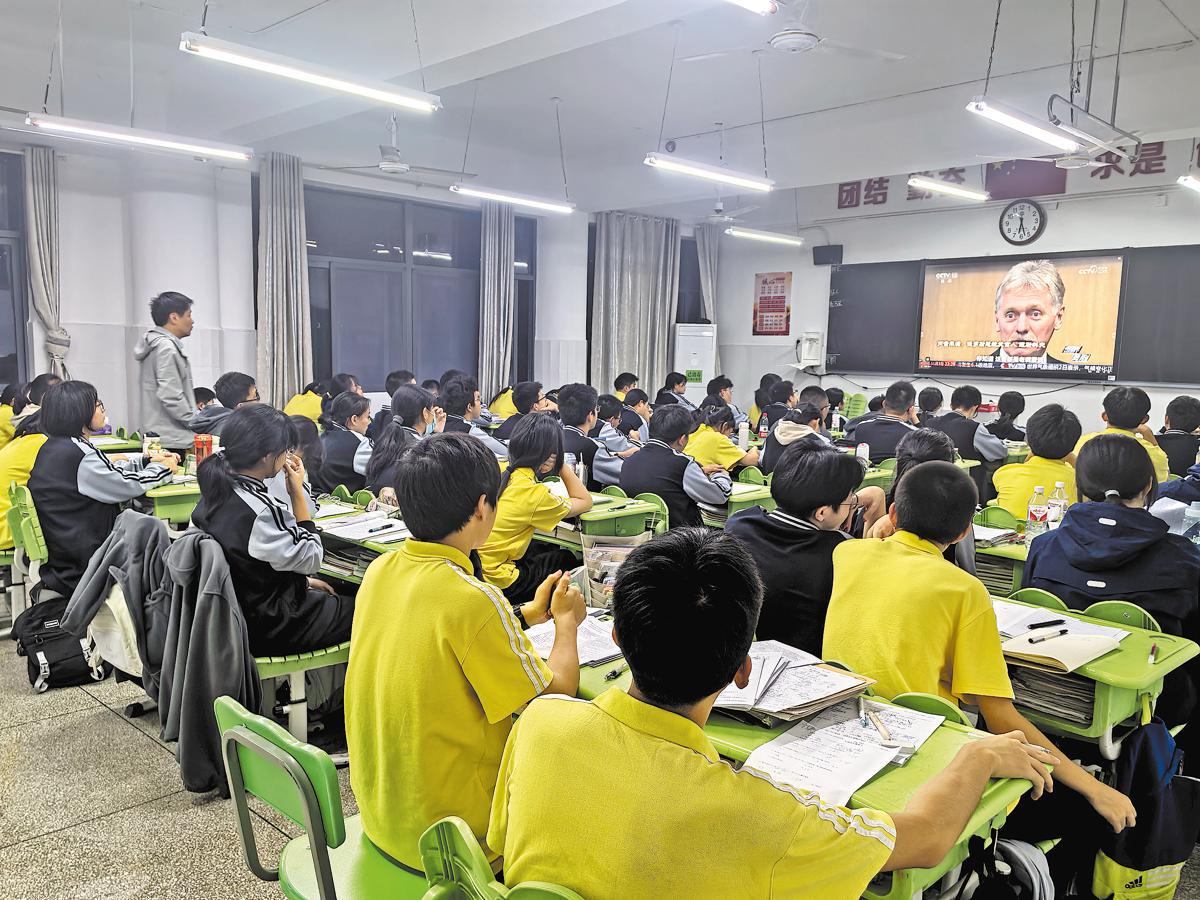Wuhan school sets a record with self-learning model
Personalized, task-based method sees 109 students ace gaokao


The unique teaching model at a high school in Wuhan in Hubei province proves that self-learning motivated by students' curiosity and passion for knowledge is key to good academic performance.
Hanyang No 1 High School in Caidian district set a historical record in this year's gaokao, or college entrance examination. A total of 109 students scored above 600 points, with a first-tier university admission rate of 87.31 percent. Chen Yongzheng, the provincial top scorer among science students in this year's gaokao, is from the school.
In recent years, the school has earned an enviable reputation among parents for good gaokao results. However, its own admission score for middle school students was relatively low compared to other provincial model high schools in Wuhan.
The secret to its success is that the school prioritizes students' independent growth, encouraging them to find personalized learning approaches based on their strengths, according to Li Haixia, president of the school.
In most classes in Chinese high schools, teachers mainly give lectures while students listen and take notes. But at her school, it is the opposite.
Li said here teachers first prepare a guided learning plan divided into three sections: pre-class foundation exercises, in-class inquiry tasks, and post-class consolidation work.
At self-study classes, students work independently — simple preparatory exercises can be completed by reviewing the textbook. For more difficult questions, students are separated into groups to figure out answers for each question.
And at presentation classes, students stand on the rostrum to explain their answers using PPT or the blackboard, while peers ask questions and provide their insights. The teacher summarizes and gives lectures in the end.
"It sparks collaborative discussion, which is far more effective than the teacher giving speeches all the time," Li said, adding that they genuinely empower learners through three core principles: "teaching tailored to learning needs"; "task-driven instruction"; and "student-centered approach".
There's no rigid time quota for lectures or presentations; new and review lessons adapt flexibly, but those three principles remain central, she said. "The 'learning pyramid' theory holds that students retain 70-80 percent of knowledge when actively teaching others, versus just 20 percent from passive listening."
Every day, each class has six self-study courses when students practice the lessons they wish to. They can also ask teachers questions.
"They formed the habit of being concentrated, quiet, and independent at self-study sessions in the first year at school," Li said. "Letting them arrange their own time helps improve efficiency and tackle each one's weakness. Students are also encouraged to use the learning methods they like, such as reciting, taking notes, and dictating. In that case, they are not forced to learn, but want to learn."
Li said the provincial champion student Chen completed all the assignments given by the teachers, but instead of doing extra homework, he thoroughly analyzed each question, seeking out similar problems and even creating his own variations. The teacher then followed his learning approach, specifically curating this type of practice material for him.
Benefiting from the tailored teaching, self-learning method, the school's gaokao performance has been improving in recent years, according to Li.
Chen's class achieved a 100 percent admission rate to "Double First-Class" universities, with an average score of 631 points.
Zhu Hui, the head teacher, shared his recipe for success: "We built a strong learning atmosphere where students supported and pushed each other forward. We taught students to stay grounded, progress step by step, and avoid unrealistic expectations or overconfidence. We treated every student fairly and with respect — no one was left behind, and each individual's potential was valued. We focused on efficiency over exhaustion, prioritizing smart learning instead of prolonged, ineffective study sessions."
In terms of seat arrangement, the class utilized online software for randomized allocation and adhered to a weekly rotation every Sunday morning. "So students eagerly anticipated their new seatmates each week, and had the excitement of going to school," he said, adding that no one ever fell asleep in his class.
Li added that the school organizes all students to watch news programs three times a week to cultivate their sense of patriotism and family, while broadening their international horizons. "We don't want to produce students who can only solve equations but don't understand human relationships or care about society," she said.
There are about 40 interesting clubs such as basketball, badminton, tai chi, street dance, music and Chinese calligraphy, offered free for students of grade one and two.
Liu Linrui, a student, recorded a high point of 626 in this year's gaokao. "I think the school's atmosphere is very good, which helps me immerse myself in study. Students compete with and help each other, which is vibrant," she said.
She was not good at math in the first place, but the teachers would answer her questions patiently and her classmates were also willing to discuss with her, which contributed to a big improvement in her math score.
Liu's mother said she became more active in learning and more confident facing challenges after entering the school.
"Most homework was done at school, so the rest time was guaranteed to improve study efficiency the next day," the mother said, adding that she agrees that self-study and clubs are good for children's comprehensive, long-term development.
Contact the writers at chenmeiling@chinadaily.com.cn
- Symphony of life in Yellow River Delta
- China unveils 2025-style police uniforms after 20 years
- Xi stresses strategic importance of work to raise minors' moral standards
- Verdict on Jimmy Lai is reached strictly in accordance with law and evidence: HKSAR govt
- Taiwan's Lai Ching-te slammed for selling war anxiety
- US urged to recalibrate its strategic perception of China




































